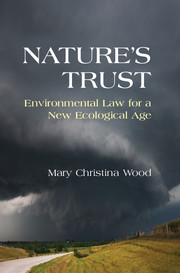Book contents
- Frontmatter
- Dedication
- Contents
- Preface
- Acknowledgments
- Part I Environmental Law: Hospice for a Dying Planet
- Part II The People’s Natural Trust
- 6 The Inalienable Attribute of Sovereignty
- 7 The Ecological Res
- 8 Fiduciary Standards of Protection and Restoration
- 9 From Bureaucrats to Trustees
- 10 Beyond Borders: Shared Ecology and the Duties of Sovereign Co-Tenant Trustees
- 11 Nature’s Justice: The Role of the Courts
- Part III The Public Trust and the Great Transition
- Notes
- Index
9 - From Bureaucrats to Trustees
Published online by Cambridge University Press: 05 June 2014
- Frontmatter
- Dedication
- Contents
- Preface
- Acknowledgments
- Part I Environmental Law: Hospice for a Dying Planet
- Part II The People’s Natural Trust
- 6 The Inalienable Attribute of Sovereignty
- 7 The Ecological Res
- 8 Fiduciary Standards of Protection and Restoration
- 9 From Bureaucrats to Trustees
- 10 Beyond Borders: Shared Ecology and the Duties of Sovereign Co-Tenant Trustees
- 11 Nature’s Justice: The Role of the Courts
- Part III The Public Trust and the Great Transition
- Notes
- Index
Summary
The current political frame controlling environmental law turns many government officials into pawns of moneyed power, as prior chapters explained. The frame allows vast and amorphous discretion that proves highly susceptible to corruption; it bends too often to the influence of profiteering industries. Behind the facade of law, such discretion repeatedly dupes the citizens while permitting corporations to pillage the public commonwealth. In contrast, the fiduciary role stands exacting and rigorous, wrapped in time-tested procedural duties. Justice Benjamin Cardozo once said: “A trustee is held to something stricter than the morals of the market place. Not honesty alone, but the punctilio of an honor the most sensitive.” Fiduciary duties require the trustee to act strictly on behalf of the public beneficiaries.
Steadfast and unbending loyalty to the beneficiaries remains the essence of any trust. It has always been recognized that a trustee holds tremendous power over the assets and that without strict procedural duties, he might abuse that power to serve his own self-interest. The fiduciary duty thus places clear boundaries on what the trustee can and cannot do. As Justice Cardozo explained, “Many forms of conduct permissible in a workaday world for those acting at arm’s length, are forbidden to those bound by fiduciary ties…. Only thus has the level of conduct for fiduciaries been kept at a level higher than that trodden by the crowd.”
- Type
- Chapter
- Information
- Nature's TrustEnvironmental Law for a New Ecological Age, pp. 188 - 207Publisher: Cambridge University PressPrint publication year: 2013



